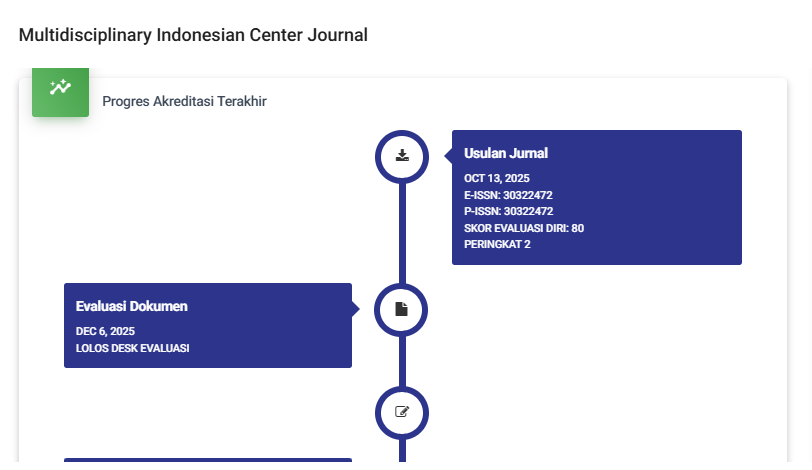STRENGTHENING ENGLISH LANGUAGE SKILL: ENGLISH LANGUAGE LEARNING PROGRAMME BASED ON CONTEXTUAL TEACHING AND LEARNING FOR THE YOUNG GENERATION OF TEGAL ISLAND
DOI:
https://doi.org/10.62567/micjo.v2i4.1235Keywords:
English learning, contextual teaching and learning, Remove English learning, Tegal IslandAbstract
This community service program aimed to enhance the English language skills of elementary school students on Tegal Island, Lampung Province, through the implementation of a Contextual Teaching and Learning (CTL) approach. Limited English proficiency among local children has long hindered effective communication with foreign visitors and restricted opportunities for community-based tourism development. To address this challenge, the program incorporated basic English vocabulary related to the beach environment into interactive activities, such as songs, games, visual aids, and direct exploration of local surroundings. These methods were designed to provide authentic, engaging, and memorable language learning experiences tailored to the learners’ environment. A pre-test and post-test design was employed to evaluate the program’s effectiveness. The results demonstrated a substantial improvement in students’ vocabulary mastery, with mean scores rising from 61.36 on the pre-test to 89.73 on the post-test. Statistical analysis using a paired sample t-test revealed a significance value of 0.000 (p < 0.05), confirming that CTL significantly enhanced vocabulary acquisition. The normalized gain (N-Gain) indicated a high level of progress among participants, showing consistent improvement across all learners. Beyond cognitive gains, qualitative observations indicated that students exhibited greater confidence, motivation, and environmental awareness as they linked English lessons to familiar contexts. This program illustrates that CTL offers a practical, low-cost, and highly effective strategy for empowering youth in remote island communities. By contextualizing English instruction in real-life settings, CTL not only fosters academic achievement but also supports community engagement, cultural pride, and sustainable human resource development in rural tourism areas.
Downloads
References
Creswell, J. W. (2016). Educational Research: Planning, Conducting, and Evaluating Quantitative and Qualitative Research (S. Paul A (ed.); Fourth Edi).
Darsana, I. M., & Sudjana, I. M. (2022). A Literature Study of Indonesian Tourism Human Resources Development in the Era of Society 5.0. AL-ISHLAH: Jurnal Pendidikan, 14(3), 2691–2700. https://doi.org/10.35445/alishlah.v14i3.2014
Kaprisma, H. (2022). Makara Human Behavior Studies in Asia Empowerment of Tidung Island Coastal Communities through Language Toward Tourism Resilience Empowerment of Tidung Island Coastal Communities through Language. 26(1), 66–73.
Kurniati, E., & Kumalasari, A. (2024). English-Speaking Learning for Fifth-Grade Elementary School Students Using a Contextual Learning Model Assisted by Flashcards. Jurnal Ilmiah Universitas Batanghari Jambi, 24(2), 1300. https://doi.org/10.33087/jiubj.v24i2.5221
Lukman, L. (2024). Development of Contextual Learning Models to Improve Student’s Speaking Skills. Journal of Languages and Language Teaching, 12(1), 198. https://doi.org/10.33394/jollt.v12i1.9128
Mallika, A. I. (2024). The Influence of the Contextual Teaching and Learning ( CTL ) Model on Improving Critical Thinking Skills in Mathematics among Junior High School Students. 02(02), 41–48.
Muliani, M., & Sumarsono, D. (2019). Contextual Teaching Learning (Ctl) Approach in Speaking Materials for Students’ 21St Century Skill: Does It Have Any Effect? Jo-ELT (Journal of English Language Teaching) Fakultas Pendidikan Bahasa & Seni Prodi Pendidikan Bahasa Inggris IKIP, 6(2), 99. https://doi.org/10.33394/jo-elt.v6i2.2362
Tomora, D. (2024). The impact of foreign language exposure on early childhood language development: A critical review. https://doi.org/10.20944/preprints202405.1216.v1
Utami, N., Yahrif, M., Rosmayanti, V., & Siradjuddin, S. (2023). The Effectiveness of Contextual Teaching and Learning in Improving Students’ Reading Comprehension. Journal of Languages and Language Teaching, 11(1), 83. https://doi.org/10.33394/jollt.v11i1.6732
Yunitasari, F., Sintawati, M., & Mastul, A.-R. H. (2023). The Application of Contextual Teaching and Learning for Increasing Learning Outcomes and Reducing Anxiety in Elementary School Mathematics. International Journal of Learning Reformation in Elementary Education, 2(02), 77–85. https://doi.org/10.56741/ijlree.v2i02.283
Downloads
Published
How to Cite
Issue
Section
License
Copyright (c) 2025 Ayu Andriyaningsih, Vike Aprilianin MS, Sutiyono

This work is licensed under a Creative Commons Attribution-ShareAlike 4.0 International License.



























